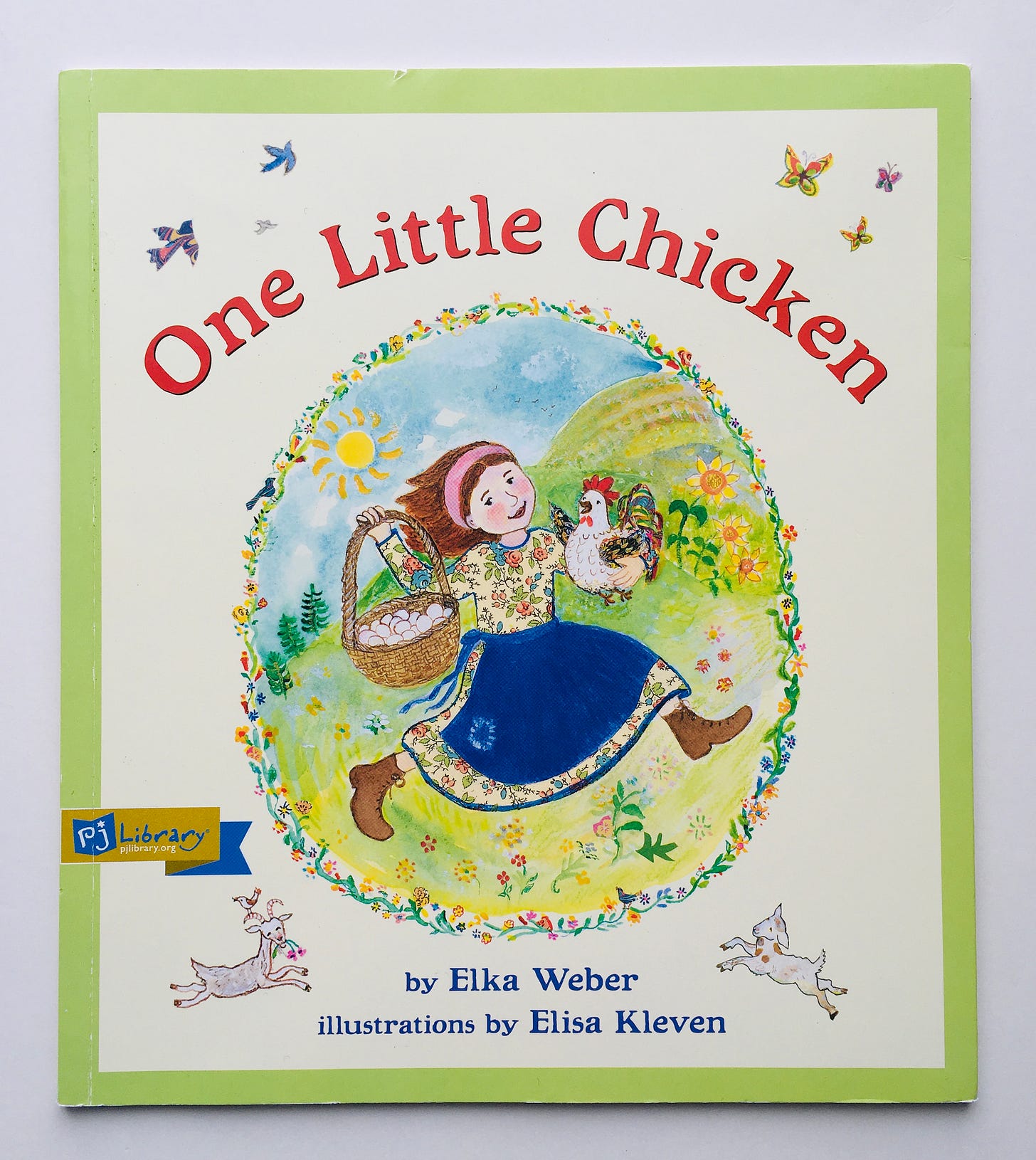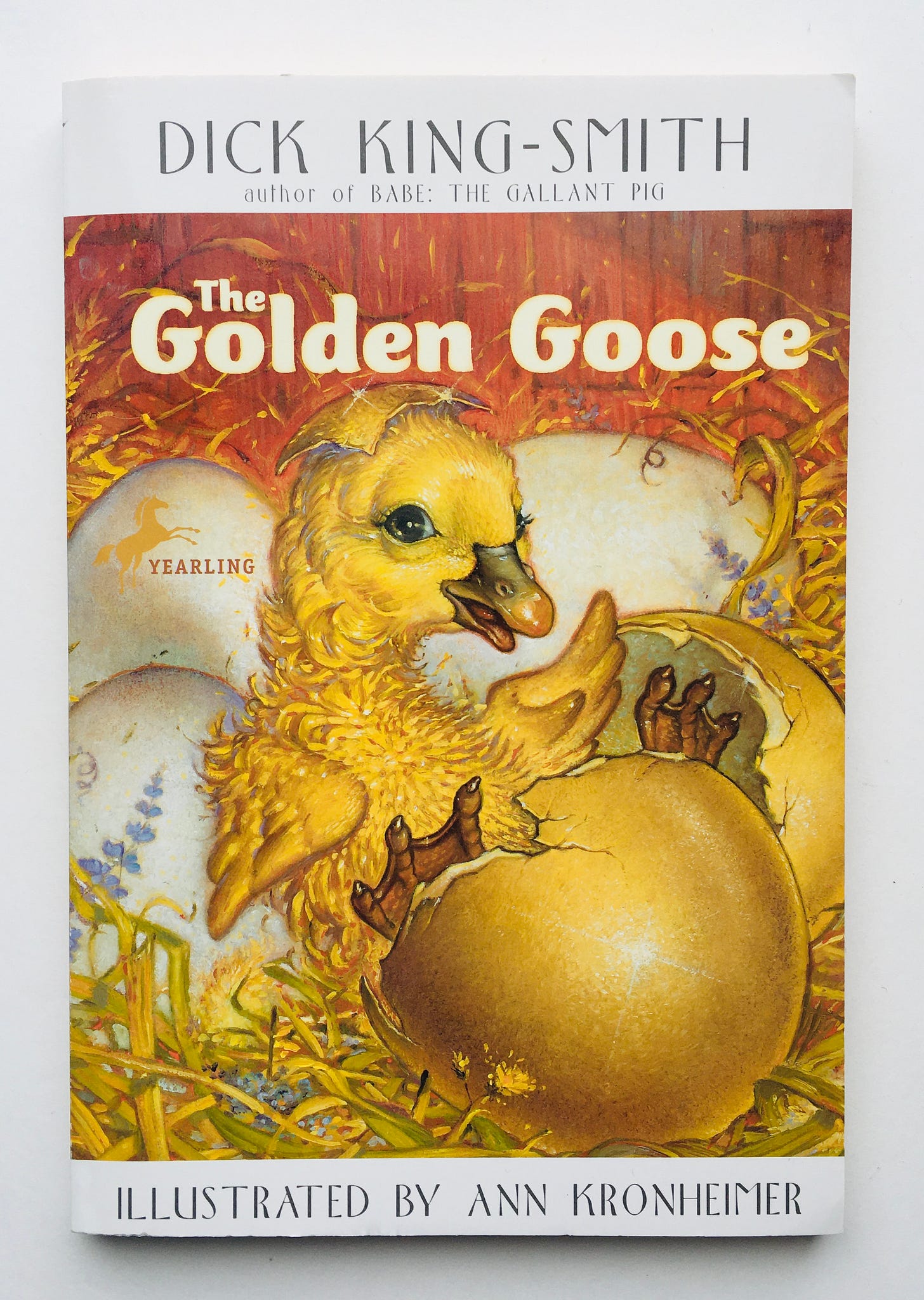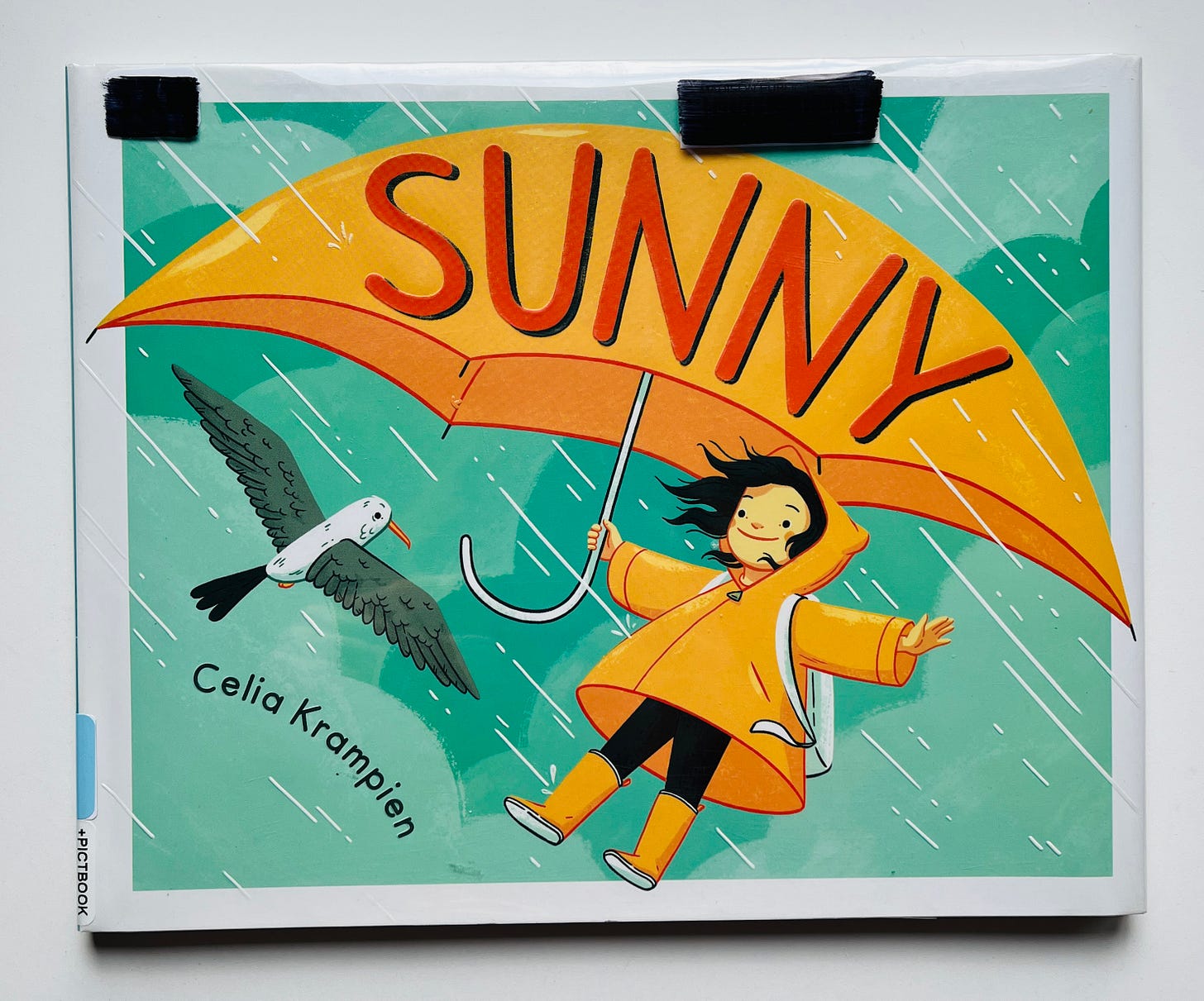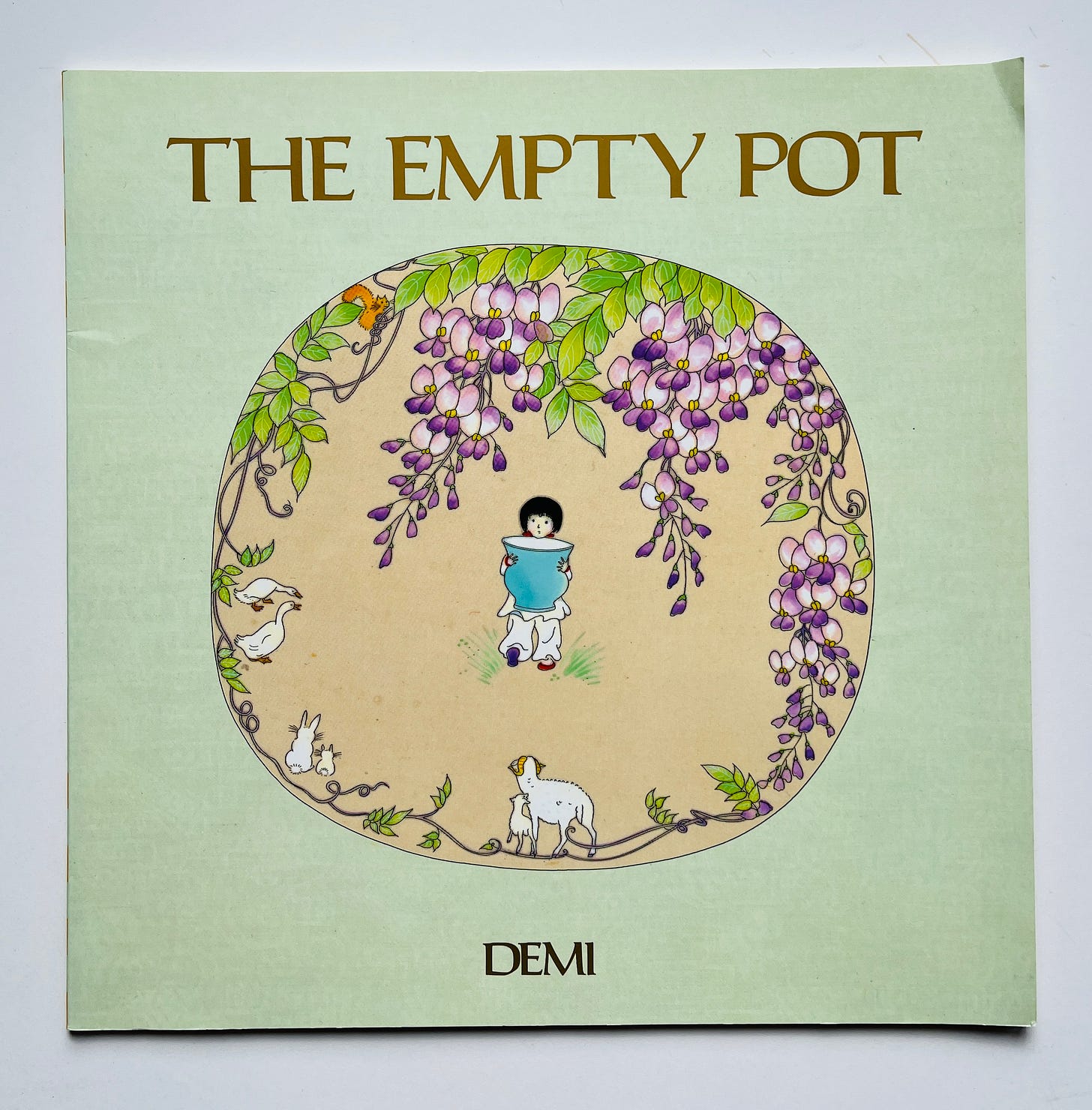Good morning.
Let’s SPRING right into this issue, shall we? (I will never, ever pass up the opportunity to pun.)
Rain Feet by Angela Johnson, illustrated by Rhonda Mitchell (1994)
If you have babies and toddlers and you’re not familiar with the Joshua books, make sure you remedy that right away, because they are the sweetest little board books I know. The stories are simple — they’re for the littlest littles, after all — but somehow Johnson manages to capture the pure delight of even the smallest things in life, in only a few sentences.
Here, Joshua sits on his front steps to put on his boots and goes out to play in the rain, hopping and jumping in puddles, “with rain feet.” That’s it. That’s all the action to be had. But trust me when I say that, coupled with Mitchell’s expressive watercolor illustrations, this teeny story is captivating for the youngest readers and completely charming for the rest of us.
Sunny by Celia Krampien (2020)
“Most people don’t like rainy days… but not Sunny.”
In this upbeat story, readers join a little girl named Sunny one rainy day as she pulls out her yellow umbrella, only to be carried away on a big gust of wind. “Most people” would find this a distressing turn of events… but not Sunny. She soars above her small town until she’s blown out to sea. “Most people” would think this was awful… but not Sunny.
So goes the rest of Sunny’s adventure, where she turns an increasingly bad situation into opportunity after opportunity to look on the bright side and enjoy the metaphorical — and literal — ride, until she just can’t anymore. And that’s truly the best part of this book — what could have been a didactic lesson on staying positive no matter what (even when you’re trapped alone in a boat stranded on top of a huge rock) is instead a much better, and genuinely entertaining, life lesson about optimism in reality.
Everything about this one is cheerful, including Krampien’s bright, energetic digital illustrations, but it’s her tender message here that I love the most: that we can — and should — do our best to be sunny, but not at the detriment of stuffing our feelings and being human.
The Empty Pot by Demi (1990)
In this thought-provoking tale that borrows elements of traditional folklore, the children of ancient China — including a young boy named Ping — are given a seemingly impossible task by the emperor: to grow the most beautiful flower from a seed. Whoever is able to do this will succeed him on the throne.
Naturally, the children encounter all the obstacles anyone who has done any gardening will recognize, and they all decide to cheat except Ping, who must, in the end, present an empty pot to the emperor.
I won’t spoil the story, only say that this is one of those rare books that teach truly valuable lessons — here, about honesty and integrity — without so much as a whiff of heavy-handedness or preaching. Demi’s always delicate line-drawn illustrations beautifully support the simplicity — and appeal — of this poignant tale.
One Little Chicken by Elka Weber, illustrated by Elisa Kleven (2011)

This unique story is a Jewish folktale based on a story from the Talmud, in which a lost chicken wanders into a family’s yard and creates a chain reaction. Leora’s mother says, “Finders aren’t keepers” — a line that repeats throughout the text — “This chicken isn’t our chicken,” and so instead of eating the eggs the chickens lays, they let them hatch into chicks, eventually selling the chicks for a goat, making cheese from the goat’s milk, selling the cheese for another goat, until goats have taken over their yard. Finally (and after Leora’s mother is about to lose her mind with all the animals), the man who originally lost the chicken happens to come by, and the family gives him the herd and a basket of eggs. The man is flabbergasted, as most people would be, but Leora explains, “Well, of course. We’re supposed to give back lost things.”
Kleven’s busy, vibrant mixed media collages with watercolors, ink, pastels, and colored pencils are as dense and delightful as that list implies — there is a lot going on in Kleven’s images here, as in all of her work, making this both fun to look at as well as listen to. A note from Weber at the back of the book reveals the origin of the story, based on a 1st-century rabbi’s experience, as well as her own interpretation of the message therein: “saintliness…may be beyond us, but we all have the power to enrich our lives with small acts of great kindness.” Indeed.
(If you enjoy this title, check out another version of the same story: A Hen for Izzy Pippik by Aubrey Davis. It’s another good one for spring.)
Building by Henry Cole (2022)
This straightforward tale is less a narrative and more a fascinating peek into the lives of beavers, from the beginning of building a dam until it’s a safe, sturdy place — that has drastically changed the surrounding landscape — ready to receive babies. A predator arrives, as does a storm, but this is presented in an entirely calm way, as just the way nature works, so there’s little to no stress for even the youngest readers. (Nonfiction lovers from preschool to mid-elementary will deeply enjoy this one.)
By far the best part is Cole’s astoundingly detailed illustrations, created with Micron pen and acrylic paints, which bring the world of this beaver family — and the wonder of what beavers do, which is nothing short of incredible — to full life.
The Golden Goose by Dick King-Smith (2003)

Do you know Dick King-Smith? I didn’t until we read Lady Lollipop (I reviewed it in issue No. 7) and realized there are a huge number of books out there that we’re missing. (Believe me, this thought keeps me up at night and not only as it pertains to children’s books — I lament all the titles I’ll never get to in my lifetime.)
When I spotted The Golden Goose at a library sale, I snapped it up, putting my hopes on King-Smith’s reputation, and it did not disappoint. It is, just as it says, the story of a golden goose — a tiny little golden goose that hatches from a golden egg and changes, over and over, a poor family’s fortune and happiness in life through a series of wild and wonderful happenings. This would an excellent read-alone title for a child who has just begun on chapter books — the chapters are short, with Kronheimer’s endearing drawings on almost every page, with action that moves along nicely — or a read-aloud for spring. It’s perfectly charming and sweet.
Snowman - Cold = Puddle: Spring Equations by Laura Purdie Salas, illustrated by Micha Archer (2019)
In this incredibly clever and enjoyable title, one spring “equation” appears per page:
stream + snowmelt = stampede!
bumblebees x flowers = blueberries
frogs + night = symphony
But don’t let the seeming simplicity of this one fool you — accompanying each tiny poem (and they are poems) is a paragraph of applicable nonfiction facts. Coupled with Archer’s intricate and colorful mixed media collage (perfect, in my opinion), this is hands-down one of the most inventive and delightful science poetry books I know. Don’t miss it.
🌷Want more?
Download my first-ever seasonal guide, Can we read? Children’s Picture Books for Spring — 28 pages’ worth of reviews, covering 30 picture books for ages 0-10.
Published over a span of 67 years, these titles are among my most recommended — from board books to poetry to short, episodic chapter books suitable for little listeners — including eight reviews that have never before been published in my newsletter, all to make your reading life easier this spring.
If seasonal reading is your jam — or you’d like it to be but don’t know where to begin — let me save you time and energy: use this guide to place holds at your library and/or order from your favorite bookstore and start reading around the year with your family today.
I also have a Bookshop.org list, Books for spring, in case you’d like to visually browse and/or support this newsletter in another way — I get a tiny commission if you use this link to make a purchase. (Thank you!)
Happy spring, you lovely human 🩷
Sarah









This is such an incredible list, I love all of them. One of my favorite things about your lists is not just the care (which is obvious from everything you do) but the thoughtfulness of the list itself. Your seasonal lists are some of my favorites and I wait for them every season!
Such a great list